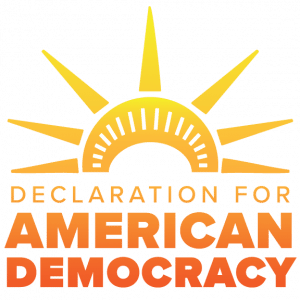This Week in 200 Words
In state updates, the court ordered lawmakers in North Carolina to draw up new maps before the 2020 elections. Louisiana has upgraded the software on all its states voting machines. Alaska attempted to open its primary elections to all voters as well as reinforce campaign financial disclosure. Oregon participated in an election security drill in preparation of the upcoming election. Voters in Mississippi experienced errors in voting machines as the machine highlighted the opposite candidate that they voted for. Montana Governor Bullock’s executive order that mandated organizations to publish their donations is being challenged by a conservative group.
In other news, former President Obama unveiled his new Redistricting U movement to address partisan gerrymandering. Former candidate for Georgia Governor Stacey Abrams declined to run for Senator, to instead focus on voting rights. More than 100 democracy reform organizations are pushing Congress to overturn Citizens United and groups are spending money to end discriminatory gerrymandering and to push for election security.
National News
Los Angeles Times: Obama takes on partisan gerrymandering with new initiative
Former President Barack Obama announced a new initiative this week aimed at ending partisan gerrymandering. In one of his first public political actions since he left the White House, Obama on Monday unveiled Redistricting U on Twitter as an in-person training arm of the All on the Line project, a grassroots advocacy campaign fighting for fair electoral maps ahead of the 2020 census count and redistricting in 2021.
Vice News: The FEC Won’t Be Able to Reform Super PACs Before 2020: ‘That’s Kind of Crazy’
Federal Election Commission Chairwoman Ellen Weintraub knows the agency could have done more to prevent the Russian interference in the 2016 election — but ideological differences in the agency made it impossible to get anything done. Things are about to get worse at the nation’s only federal campaign watchdog before they get better.
Fulcrum: 100+ democracy reform groups push Congress to overturn Citizens United
More than 100 democracy reform organizations are making another attempt at convincing Congress to take action to limit the influence of big money in politics. A letter signed by 123 organizations was sent to members of the House of Representatives on Thursday, urging them to cosponsor a resolution proposing a constitutional amendment to limit how much can be raised and spent to influence elections. Some of the organizations include American Promise, Common Cause, End Citizens United Action Fund, the NAACP, Public Citizen, U.S. PIRG and Wolf-PAC.
Vox: Stacey Abrams’s fight for voting rights matters more than her political future
On Wednesday, Sen. Johnny Isakson, a three-term incumbent from Georgia, announced that he would retire from office at the end of 2019. For a brief moment, the Republican’s announcement reignited a question that has been lingering for months: Will this push Stacey Abrams, one of the highest-profile figures to emerge from the 2018 midterm elections, to run for national office?
The Washington Post: John Roberts said we need to rely on states to solve gerrymandering. That’s not going so well.
The Supreme Court ruled in June that federal courts are closed to claims of partisan gerrymandering. But never fear, Chief Justice John G. Roberts Jr. wrote for the majority: “numerous [states] are restricting partisan considerations in districting through legislation,” either by legislative enactment or ballot initiative. That alternative method to solve the problem is no saving grace. Many states simply do not allow ballot initiatives. In others, entrenched politicians will not give up their power
ABC News: Groups answer Supreme Court with million-dollar push to counter gerrymandering
After a setback at the Supreme Court earlier this year, advocates for what they see as fairer, less-partisan election maps nationwide are stepping up their fight at the state level. The League of Women Voters, one of the country’s largest and oldest non-partisan voter advocacy organizations, is launching on Thursday a “multi-million-dollar, multi-year” effort to end discriminatory gerrymandering, the practice of drawing electoral maps for political gain. The group announced plans to spend $500,000 this year alone.
A national progressive group is spending over $100,000 on a campaign to pressure Senate Majority Leader Mitch McConnell and other Republican senators to pass a bill to provide $600 million in election security funding. The group, Stand Up America, has rented a billboard alongside the Kennedy Bridge near McConnell’s office in downtown Louisville, Ky., from Sept. 1 through Sept. 9 that includes an image of McConnell’s face and the message, “Tell Mitch McConnell: Stop blocking election security funding.”
State Updates
North Carolina-New York Times: The Battle Over the Files of a Gerrymandering Mastermind
At the heart of a decisive court ruling on Tuesday striking down North Carolina’s state legislative maps was evidence culled from the computer backups of the man who drew them: Thomas B. Hofeller, the Republican strategist and master of gerrymandering, who died last year. Documents from the backups, which surfaced after his death, were also central to the legal battle over adding a citizenship question to the 2020 census. An enormous stash of digital files, covering Mr. Hofeller’s work in almost every state, has yet to be examined.
Alaska-KTUU: State denies election reform initiative; backers say appeal is likely
The Alaska Division of Elections denied an initiative that would have significantly changed the way that elections are run in the state. The initiative would have tightened up campaign finance disclosure, instituted a ranked-choice voting system, and opened up primary elections to all voters.
Oregon-KTVZ: Oregon, counties take part in election security drill
It was a tabletop exercise, held as federal officials work to bolster defenses against interference in the 2020 elections, with states being a main line of defense against attempts by Russia or others to disrupt the elections.
Louisiana-KPLC News: Louisiana Secretary of State explains election security measures
Kyle Ardoin, the Louisiana Secretary of State, said his office has been working day in and day out to protect upcoming elections by updating software on all voting machines. “We also leased all new early voting equipment where they were running on the windows 7 platform, so now we’re windows 10 platform for the early voting machines. We’re really confident about what we’ve done to secure our elections and be sure our votes are counted accurately,” Ardoin said.
Mississippi-The Washington Post: ‘It is not letting me vote for who I want’: Video shows electronic machine changing ballot in Mississippi
Over and over again, the man touches a box on an electronic voting machine to cast his ballot for Mississippi gubernatorial candidate Bill Waller Jr. And over and over again, the machine instead checks off a vote for Waller’s opponent in Tuesday’s GOP runoff, Mississippi Lt. Gov. Tate Reeves.
Montana-The Lewiston Tribune: Group challenges Montana’s ‘dark money’ order
A conservative advocacy group is challenging Montana Gov. Steve Bullock’s executive order that requires organizations that receive large state contracts to report political contributions that exceed $2,500, even if those disclosures aren’t required under federal election laws. The challenge was filed Tuesday in U.S. District Court by the Illinois Opportunity Project, which said it plans to spend money during the 2020 election cycle to urge Montana gubernatorial candidates to repeal the executive order.

